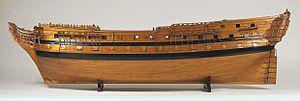Dutch ship Vrijheid

Model of the ship Vrijheid.
|
|
| History | |
|---|---|
|
|
|
| Name: | Vrijheid |
| Launched: | 1782 |
| Commissioned: | 1782 |
| Decommissioned: | 1795 |
|
|
|
| Name: | Vrijheid |
| Commissioned: | 1795 |
| In service: | 1795 |
| Out of service: | 1797 |
| Captured: | 11 October 1797 |
| Fate: | Captured |
|
|
|
| Name: | HMS Vryheid |
| Acquired: | 1797 |
| Commissioned: | 1797 |
| Decommissioned: | 1811 |
| Reclassified: |
|
| Fate: | Disposed in 1811 |
| General characteristics | |
| Class and type: |
|
| Propulsion: | Sails |
| Sail plan: | Full rigged ship |
| Armament: | 74 Guns |
Vrijheid was a Dutch 74-gun third rate ship of the line of the navy of the Dutch Republic, the Batavian Republic, and the Royal Navy. The order to construct the ship was given by the Admiralty of Amsterdam. The ship was commissioned in 1782.
In 1783, a squadrion consisting of the ships Vrijheid, Noordholland, Hercules, Drenthe, Prins Willem and Harlingen was dispatched to the Mediterranean to deal with differences that had arisen with Venice. On 2 February 1784, the squadron docked at the coast near the island of Minorca. In the night between 3 and 4 February a storm blew up which lasted for 48 hours. Vrijheid was almost smashed on the rocks and only just managed to stay afloat, while Drenthe keeled over and sank.
In 1795, the ship was commissioned in the Batavian Navy.
On 11 October 1797 Vrijheid took part in the Battle of Camperdown as the flagship of Admiral Jan Willem de Winter. At a certain point, Vrijheid was engaged by four British ships, and after heavy fighting the ship surrendered.
The ship was renamed HMS Vryheid, and from 1798 she served as a prison ship. In 1802 she became a powder hulk until she was sold in 1811.
...
Wikipedia
